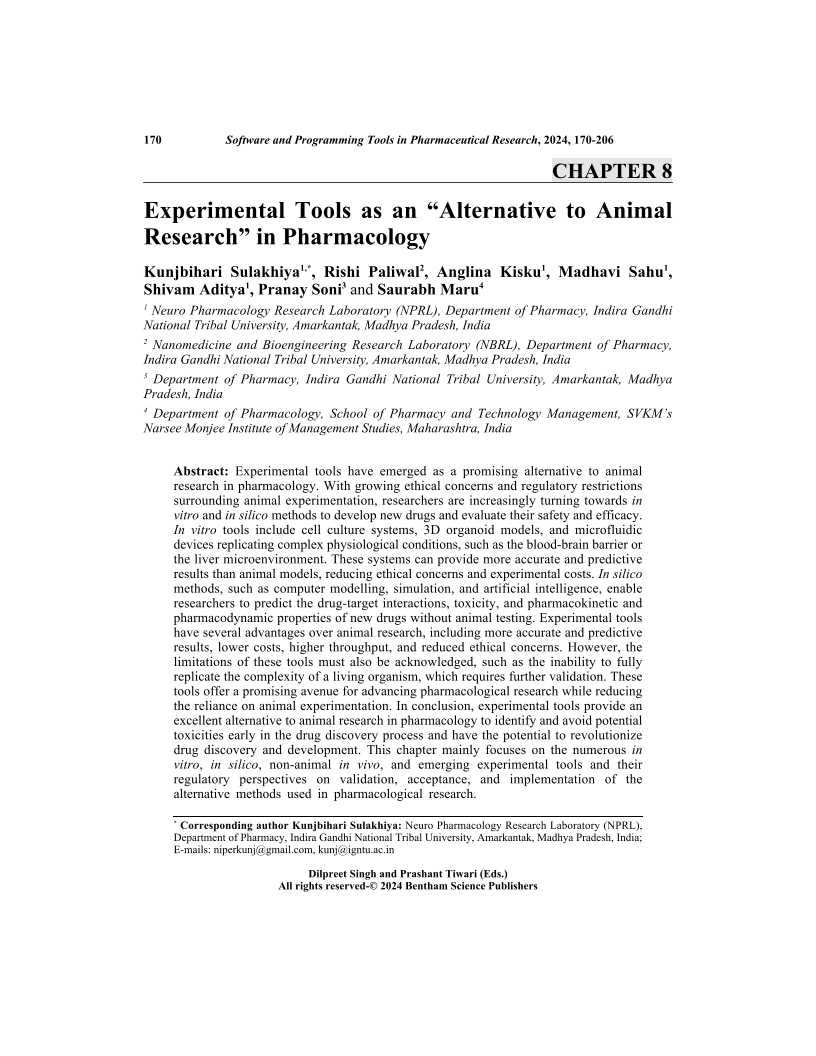Experimental Tools as an "Alternative to Animal Research" in Pharmacology

- Authors: Kunjbihari Sulakhiya1, Rishi Paliwal2, Anglina Kisku3, Madhavi Sahu4, Shivam Aditya5, Pranay Soni6, Saurabh Maru7
-
View Affiliations Hide Affiliations1 Neuro Pharmacology Research Laboratory (NPRL), Department of Pharmacy, Indira Gandhi National Tribal University, Amarkantak, Madhya Pradesh, India 2 Nanomedicine and Bioengineering Research Laboratory (NBRL), Department of Pharmacy, Indira Gandhi National Tribal University, Amarkantak, Madhya Pradesh, India 3 Neuro Pharmacology Research Laboratory (NPRL), Department of Pharmacy, Indira Gandhi National Tribal University, Amarkantak, Madhya Pradesh, India 4 Neuro Pharmacology Research Laboratory (NPRL), Department of Pharmacy, Indira Gandhi National Tribal University, Amarkantak, Madhya Pradesh, India 5 Neuro Pharmacology Research Laboratory (NPRL), Department of Pharmacy, Indira Gandhi National Tribal University, Amarkantak, Madhya Pradesh, India 6 Department of Pharmacy, Indira Gandhi National Tribal University, Amarkantak, Madhya Pradesh, India 7 Department of Pharmacology, School of Pharmacy and Technology Management, SVKMs Narsee Monjee Institute of Management Studies, Maharashtra, India
- Source: Software and Programming Tools in Pharmaceutical Research , pp 170-206
- Publication Date: March 2024
- Language: English
Experimental Tools as an "Alternative to Animal Research" in Pharmacology, Page 1 of 1
< Previous page | Next page > /docserver/preview/fulltext/9789815223019/chapter-8-1.gif
Experimental tools have emerged as a promising alternative to animal research in pharmacology. With growing ethical concerns and regulatory restrictions surrounding animal experimentation, researchers are increasingly turning towards in vitro and in silico methods to develop new drugs and evaluate their safety and efficacy. In vitro tools include cell culture systems, 3D organoid models, and microfluidic devices replicating complex physiological conditions, such as the blood-brain barrier or the liver microenvironment. These systems can provide more accurate and predictive results than animal models, reducing ethical concerns and experimental costs. In silico methods, such as computer modelling, simulation, and artificial intelligence, enable researchers to predict the drug-target interactions, toxicity, and pharmacokinetic and pharmacodynamic properties of new drugs without animal testing. Experimental tools have several advantages over animal research, including more accurate and predictive results, lower costs, higher throughput, and reduced ethical concerns. However, the limitations of these tools must also be acknowledged, such as the inability to fully replicate the complexity of a living organism, which requires further validation. These tools offer a promising avenue for advancing pharmacological research while reducing the reliance on animal experimentation. In conclusion, experimental tools provide an excellent alternative to animal research in pharmacology to identify and avoid potential toxicities early in the drug discovery process and have the potential to revolutionize drug discovery and development. This chapter mainly focuses on the numerous in vitro, in silico, non-animal in vivo, and emerging experimental tools and their regulatory perspectives on validation, acceptance, and implementation of the alternative methods used in pharmacological research.
-
From This Site
/content/books/9789815223019.chapter-8dcterms_subject,pub_keyword-contentType:Journal -contentType:Figure -contentType:Table -contentType:SupplementaryData105

